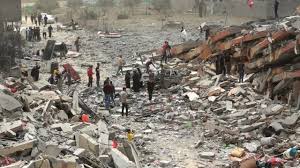GAZA (AFP): Israel launched more deadly strikes on besieged Gaza on Thursday as world powers watched nervously whether the country would retaliate against a weekend attack by its arch enemy Iran.
The Israeli army said it had bombed dozens of targets in the Palestinian coastal territory of 2.4 million people, more than six months into the bloodiest ever Gaza war.
Weeks of talks towards an Israel-Hamas truce and hostage release deal have stalled, according to Qatar’s prime minister who said the Gulf emirate was now “reassessing our role as mediator”.
Israeli Prime Minister Benjamin Netanyahu, who has vowed to destroy Hamas over its October 7 attack on Israel, also stressed on Wednesday that Israel “reserves the right to protect itself” against Iran.
The Islamic republic last weekend carried out its first ever attack to directly target its regional foe but Israel, backed by its allies, intercepted most of the 300 missiles and drones and suffered no deaths.
Iran’s attack was retaliation for an April 1 air strike, which it blamed on Israel, on the consular annex of its embassy in Damascus.
The international community has urged de-escalation since Iran’s attack on Israel which came after months of high tensions and violence involving Israel and Iran-backed groups in Lebanon, Iraq, Syria and Yemen.
“We are on the edge of a war in the Middle East which will be sending shock-waves to the rest of the world,” EU foreign policy chief Josep Borrell said ahead of a G7 meeting in Capri, Italy.
Iran has warned of “a fierce and severe response” if Israel launches any further attacks after seven of its Revolutionary Guards died in the consular strike.
However, Tehran had also sought to calm tensions through indirect diplomatic channels with its other major adversary, the United States, which is Israel’s top ally and military supplier.
Foreign Minister Hossein Amir-Abdollahian, in New York for a UN meeting, said Iran had “tried to tell the United States clearly” that it is “not looking for the expansion of tension in the region”.
‘Diplomatic sensitivities’
Washington has made clear it won’t join any Israeli attack on Iran, but has pledged to instead impose new punitive sanctions against Iran.
The European Union on Wednesday said it would impose new sanctions on Iran’s drone and missile producers.
Israeli public broadcaster Kan said Netanyahu, after discussions with US President Joe Biden, decided not to proceed with pre-arranged plans for retaliatory strikes on Iran.
“Diplomatic sensitivities came into play,” a senior Israeli official told Kan, speaking on condition of anonymity.
The official added that there would be a response, but that it would be different to the one initially planned.
US broadcaster ABC News, citing three unnamed Israeli sources, reported that Israel had “prepared for and then aborted retaliatory strikes against Iran on at least two nights this past week”.
Among the range of possible responses considered by Israel were an attack on Iranian proxies in the region or a cyberattack, the sources told ABC.
German airline Lufthansa extended its suspension of flights to and from Tehran and Beirut to the end of April and said its planes would continue avoiding Iranian airspace.
Israel’s Foreign Minister Israel Katz welcomed a European Union announcement of sanctions on Iran as “an important step” and wrote on X that “Iran must be stopped now before it is too late”.
Overnight bombing
Iran’s attack on Israel “is succeeding in taking the focus, particularly the media spotlight, off of the Gaza famine and the Gaza war and the loss of life that is taking place there,” Roxane Farmanfarmaian, a Middle East/North Africa specialist at the University of Cambridge’s POLIS department, told AFP.
“And that was very much I think what Israel planned to do,” she said.
An AFP correspondent in Gaza said Israeli artillery shelling and aircraft strikes again hit Gaza City overnight.
The Israeli military said it struck dozens of militant targets over the past day.
The war started after Hamas launched their unprecedented attack on October 7 that resulted in the deaths of 1,170 people in southern Israel, mostly civilians, according to an AFP tally based on Israeli official figures.
The militants also took about 250 hostages. Israel estimates 129 remain in Gaza, including 34 who are presumed dead.
Israel’s retaliatory offensive has killed at least 33,970 people in Gaza, mostly women and children, according to the latest toll on Thursday from the health ministry in the Hamas-run territory.
Gaza’s civil defence said Thursday it had recovered 11 more bodies in the southern city of Khan Yunis during the night.
Israel had also bombed the far-southern city of Rafah.
Gaza rescue crews recovered the corpses of eight family members, including five children and two women, from a house in Rafah’s Al-Salam neighbourhood, the civil defence service said.
One woman in Rafah, Jamalat Ramidan, told AFP she and crying children fled the carnage of a strike, stumbling over “body parts and corpses scattered all over the place”.
Stalled truce talks
Talks toward a ceasefire have stalled, said Qatari Prime Minister Sheikh Mohammed bin Abdulrahman Al-Thani, despite months of effort also involving United States and Egyptian officials.
He said his country was undertaking “a complete re-evaluation of its role because there has been damage to Qatar”, which does not have diplomatic relations with Israel.
Israel has faced growing global opposition to the Gaza war, which the United Nations and aid agencies say has left the north of the territory on the brink of famine.
Netanyahu on Wednesday rejected this, saying Israeli efforts were “above and beyond” what is needed “on the humanitarian issue,” his office said.
The UN Security Council was preparing to vote soon on an Algeria-drafted resolution for full United Nations membership for a Palestinian state, diplomatic sources said.
However, the veto-wielding United States has repeatedly expressed opposition to such a move.







